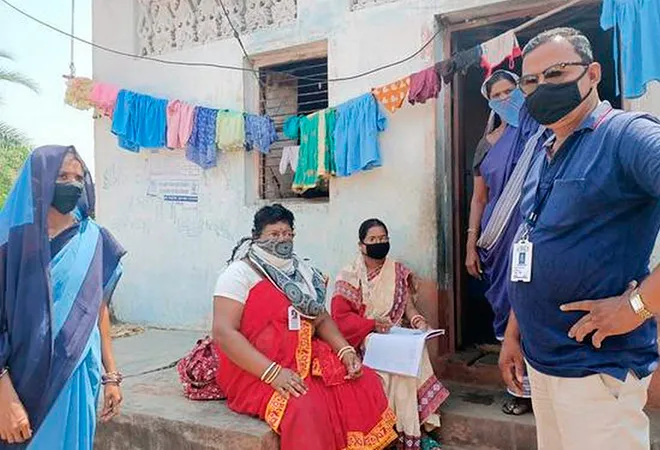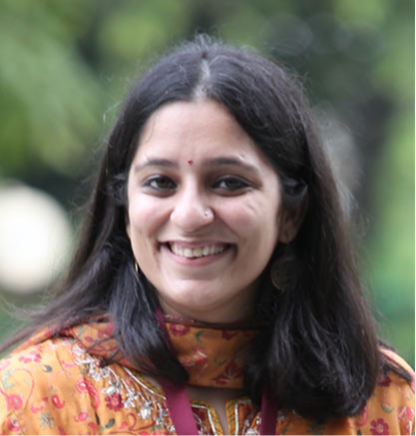-
CENTRES
Progammes & Centres
Location
 The recent COVID-19 pandemic has resulted in a rapid spread of the coronavirus, causing global concern. WHO declared it as a global public health emergency threatening the lives of millions and potentially requiring “a coordinated international response” (WHO, 2020) due to an exponential increase in infections. While many countries opted for strict measures to limit the spread of the disease, others imposed partial restrictions on non-essential internal movement calling for a lockdown.
In India, the Central government imposed a nationwide lockdown on 24 March 2020 to limit the spread of the highly-contagious COVID-19 and asked people to stay at home and maintain social distancing. With cities and work shut down, there has been a substantial increase in the number of migrants returning to their villages with almost little or no money. On arrival in their native villages, Anganwadi workers (AWW) have been assigned the responsibility of community surveillance by recording incoming migrants’ travel history, asking them to stay in quarantine for 14 days, noting symptoms, and assisting district and local administration in tracing contacts. ‘Anganwadi worker’ refers to a trained woman selected as a voluntary worker from the local community to deliver integrated services, improve linkages with the health system, and attain the key objective of enhancing the capacity of community and mothers for childcare, survival and development.
These AWWs, in charge of enhancing the nutrition of women and children across India in days of normal functioning, have now been assigned the responsibility of local level surveillance in different parts of the country. While their usual duty involves supporting breastfeeding mothers and feeding young children, (World Bank, 2020) they are now engaged in distributing nutritious ration of rice and pulses. In few states, such as Chhattisgarh, more than 24 lakh beneficiaries of 51,455 anganwadi centers benefitted from food delivered at their doorstep (ANI, 2020) by the AWWs. In the state of Maharashtra, AWWs have been involved in home delivery of cooked food to vulnerable groups, such as pregnant, lactating women and children (7 months to six years), under the Bharat Ratna APJ Abdul Kalam Amrut Yojna (ILO, 2020). They have been engaged in Panchkula (a district in Haryana) for door-to-door collection of COVID-19 data and dissemination of public welfare measures, (Hindustan Times, 2020); in Karnataka, they helped stitch and distribute masks for the destitute; (The New Indian Express, 2020); and in Jharkhand, they tracked the movement of migrants by participating as ward level monitoring committee members (Youth Ki Awaaz, 2020).
On the other hand, in Odisha, around 72,500 workers were engaged in distributing essential commodities (like dry ration and eggs) to beneficiaries, providing old age pension, and educating people (Business Line, 2020) about preventive measures to limit the spread of disease. One of the Anganwadi workers reported that they were assigned to election duty, registration of Aadhar cards, and subsequently, to collection of COVID-19 related data. In addition to recording travel history, tracking vaccination schedules and lactating mothers, and uploading all information online is part of their long list of responsibilities for which they merely receive ₹6,500 a month. This is much less than even the minimum wage of a day - set to about ₹300 by the government (Business Line, 2020). This is despite a marginal raise of the mandatory component of an anganwadi worker’s honorarium from Rs 3,000 to Rs 4,500 by the Central government in 2018 (Scroll, 2018).
Although the pandemic is global, its responses have been local. These frontline workers have been working relentlessly during the COVID-19 outbreak and are trying their best to limit the spread of virus within the community. Despite their contribution, the workers continue to remain severely underpaid with many complaining of the lack of adequate sanitation and hygiene facilities, food and water (TOI, 2020), protective gear (masks, gloves, equipment) and health insurance while discharging their duty.
The centre and the state governments need to recognise the contribution of AWWs as a vital link in the fight against COVID-19, especially at the local level, and give due attention to their safety and working conditions. They should be treated as employees and skilled workers by paying adequate remuneration instead of simply honorariums, and benefits such as pension and medical insurance should also be taken care of. Regular monitoring is needed to identify and address the challenges to keep the AWWs motivated in effectively discharging their duties.
Further, AWWs can also be trained as barefoot doctors. There is a need to build upon the existing capacity of workers by integrating their knowledge, skills, perception and experience and enhance their technical expertise to discharge their current duties more efficiently. For instance, refresher training should be provided on ways of the “new normal” of undertaking duties, while maintaining social distancing. Further, workers should be informed about preventive measures to ensure wellbeing of women and children amidst the outbreak.
The recent COVID-19 pandemic has resulted in a rapid spread of the coronavirus, causing global concern. WHO declared it as a global public health emergency threatening the lives of millions and potentially requiring “a coordinated international response” (WHO, 2020) due to an exponential increase in infections. While many countries opted for strict measures to limit the spread of the disease, others imposed partial restrictions on non-essential internal movement calling for a lockdown.
In India, the Central government imposed a nationwide lockdown on 24 March 2020 to limit the spread of the highly-contagious COVID-19 and asked people to stay at home and maintain social distancing. With cities and work shut down, there has been a substantial increase in the number of migrants returning to their villages with almost little or no money. On arrival in their native villages, Anganwadi workers (AWW) have been assigned the responsibility of community surveillance by recording incoming migrants’ travel history, asking them to stay in quarantine for 14 days, noting symptoms, and assisting district and local administration in tracing contacts. ‘Anganwadi worker’ refers to a trained woman selected as a voluntary worker from the local community to deliver integrated services, improve linkages with the health system, and attain the key objective of enhancing the capacity of community and mothers for childcare, survival and development.
These AWWs, in charge of enhancing the nutrition of women and children across India in days of normal functioning, have now been assigned the responsibility of local level surveillance in different parts of the country. While their usual duty involves supporting breastfeeding mothers and feeding young children, (World Bank, 2020) they are now engaged in distributing nutritious ration of rice and pulses. In few states, such as Chhattisgarh, more than 24 lakh beneficiaries of 51,455 anganwadi centers benefitted from food delivered at their doorstep (ANI, 2020) by the AWWs. In the state of Maharashtra, AWWs have been involved in home delivery of cooked food to vulnerable groups, such as pregnant, lactating women and children (7 months to six years), under the Bharat Ratna APJ Abdul Kalam Amrut Yojna (ILO, 2020). They have been engaged in Panchkula (a district in Haryana) for door-to-door collection of COVID-19 data and dissemination of public welfare measures, (Hindustan Times, 2020); in Karnataka, they helped stitch and distribute masks for the destitute; (The New Indian Express, 2020); and in Jharkhand, they tracked the movement of migrants by participating as ward level monitoring committee members (Youth Ki Awaaz, 2020).
On the other hand, in Odisha, around 72,500 workers were engaged in distributing essential commodities (like dry ration and eggs) to beneficiaries, providing old age pension, and educating people (Business Line, 2020) about preventive measures to limit the spread of disease. One of the Anganwadi workers reported that they were assigned to election duty, registration of Aadhar cards, and subsequently, to collection of COVID-19 related data. In addition to recording travel history, tracking vaccination schedules and lactating mothers, and uploading all information online is part of their long list of responsibilities for which they merely receive ₹6,500 a month. This is much less than even the minimum wage of a day - set to about ₹300 by the government (Business Line, 2020). This is despite a marginal raise of the mandatory component of an anganwadi worker’s honorarium from Rs 3,000 to Rs 4,500 by the Central government in 2018 (Scroll, 2018).
Although the pandemic is global, its responses have been local. These frontline workers have been working relentlessly during the COVID-19 outbreak and are trying their best to limit the spread of virus within the community. Despite their contribution, the workers continue to remain severely underpaid with many complaining of the lack of adequate sanitation and hygiene facilities, food and water (TOI, 2020), protective gear (masks, gloves, equipment) and health insurance while discharging their duty.
The centre and the state governments need to recognise the contribution of AWWs as a vital link in the fight against COVID-19, especially at the local level, and give due attention to their safety and working conditions. They should be treated as employees and skilled workers by paying adequate remuneration instead of simply honorariums, and benefits such as pension and medical insurance should also be taken care of. Regular monitoring is needed to identify and address the challenges to keep the AWWs motivated in effectively discharging their duties.
Further, AWWs can also be trained as barefoot doctors. There is a need to build upon the existing capacity of workers by integrating their knowledge, skills, perception and experience and enhance their technical expertise to discharge their current duties more efficiently. For instance, refresher training should be provided on ways of the “new normal” of undertaking duties, while maintaining social distancing. Further, workers should be informed about preventive measures to ensure wellbeing of women and children amidst the outbreak.
The views expressed above belong to the author(s). ORF research and analyses now available on Telegram! Click here to access our curated content — blogs, longforms and interviews.

Dr. Aditi Madan is Fellow and an ICSSR post-doctoral fellow at Institute for Human Development (IHD) with a PhD in Disaster Management from Asian Institute ...
Read More +
Ashok K. Madan is Executive Director with Indian Drug Manufacturers Association and an alumnus of IIFT. He has been working with the Pharma Industry since ...
Read More +